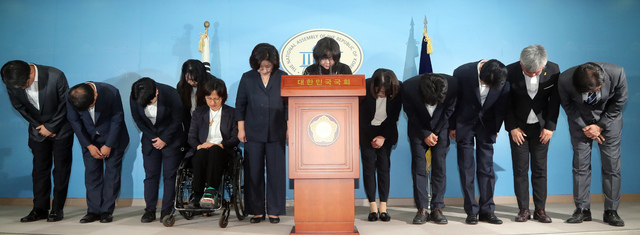Posted on : Aug.5,2018 19:24 KST
 |
|
Justice Party leader Lee Jeong-mi and fellow party members bow in gratitude to the public on July 30 for their support following the death of distinguished party lawmaker Roh Hoe-chan. (Kim Gyoung-ho, staff photographer)
|
With an approval rating of 15 percent, the Justice Party has now risen to second place among South Korea’s political parties ahead of the top-ranked opposition Liberty Korea Party, which earned just 11 percent. These are the findings announced on Aug. 3 from an opinion survey by Gallup Korea. While the Justice Party’s number of National Assembly seats dropped to five with the recent death of Roh Hoe-chan, its approval rating rose by 4 percentage points from the week before, overtaking a major opposition party with 112 seats.
Not only is it the party’s highest number since it was founded in Oct. 2012, it is also higher than the 13.03 percent proportional representation vote received by the Democratic Labor Party at the 17th parliamentary elections in 2004, when Roh entered the National Assembly as the eighth proportional representation lawmaker. This could fairly be called a new record in the history of South Korean progressive parties.
The Justice Party’s approval rating – which was just one percent at its founding – has continued to rise, hitting two digits after the local elections on June 13. Since the death of Justice Party lawmaker Roh Hoe-chan, the spotlight has turned to Roh’s political journey of advocacy for the disadvantaged and on the challenges faced by progressive parties because of the Political Funding Act, which works to the advantage of big parties.
That change of focus appears to have pushed the Justice Party above the Liberty Korea Party in the polls. Koreans have apparently responded to Roh’s final appeal to let him take the punishment and to keep supporting the Justice Party.
Now it’s the Justice Party’s turn to respond to the public. It needs to adopt a stance of even greater responsibility and dedication as a progressive party. Wedged between two larger parties, the Justice Party will face constraints. The loss of one of its lawmakers caused the dissolution of the country’s first progressive parliamentary group—which the Justice Party had formed with the Party for Democracy and Peace—and that further complicates its efforts to push forward legislation. But has there ever been a time when progressive parties haven’t struggled?
The Justice Party of today was built through laboring on behalf of the disadvantaged and of future generations by promoting laws such as the Commercial Building Lease Protection Act and the Limitation Act, by doing away with the lawmaker-only elevator and by requiring free school lunches to be made with eco-friendly ingredients – and not by throwing a pity party about being a minor party.
We hope the Justice Party will consider its 15 percent approval rating as an incentive to work even harder for the underprivileged. This should spur it on to eliminate the National Assembly’s special activity fee and to reform the electoral system and the Political Funding Act. That’s the way for the Justice Party to express the significance of its status as a progressive party.
Please direct comments or questions to [english@hani.co.kr]






